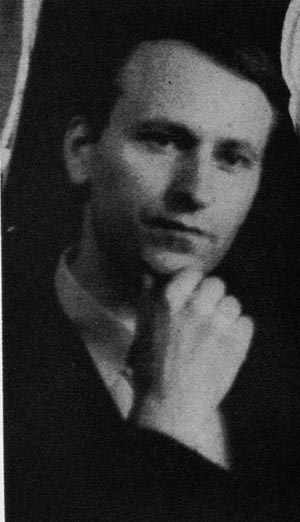
Managing Editor P. V. Vygantas
 |
www.lituanus.org |
|
Copyright
© 1957 Lithuanian
Students Association, Inc.
June,
1957 No.2(11)
Managing Editor P. V. Vygantas |
|
JONAS MEKAS - NOTES FOR A PORTRAIT
A. L.
 In the summer of 1945, after a long
trek from the Northern end of war-torn Germany, Jonas Mekas arrived at
the Displaced Persons Camp in Wiesbaden. His dust-covered suitcases
were filled with books, manuscripts and a translation in progress of a
play by Moliere. Behind him were twenty-two years in his native
Lithuania, first published stories, an editorial job at a provincial
newspaper.
In the summer of 1945, after a long
trek from the Northern end of war-torn Germany, Jonas Mekas arrived at
the Displaced Persons Camp in Wiesbaden. His dust-covered suitcases
were filled with books, manuscripts and a translation in progress of a
play by Moliere. Behind him were twenty-two years in his native
Lithuania, first published stories, an editorial job at a provincial
newspaper.
The colorful chaos of the life in the D.P. camps could not be equalled by any surrealist poem. There were too many people, too much noise, too little food. But for Jonas Mekas these were very full years. Ever since he appreciated much more the universities of life than his sporadic studies at the University of Mainz.
Although the German shop windows were bare of sausages and cheeses, the bookstores were crowded with new literary magazines and books. For us, the young Lithuanian literati, this was a fairy tale repast after the four sterile years of Soviet and Nazi occupations. We discussed Sartre, we discovered Thornton Wilder, we saw our own work in a new light. One result of this newly established contact with art at large was the literary magazine "Žvilgsniai" (The Looks) which appeared irregularly between 1945 and 1949 and of which Jonas Mekas was editor-in-chief. It was considered extremely avant-garde by the more sedate camp population, despite the fact that it was rather mild stuff as compared with the life around. It gave the Lithuanian public an extensive taste of modern authors and printed some interesting orgin-a! creations.
In his original writing Jonas Mekas developed both with boldness and restraint. He employed the new freedoms of form, but tempered with the cautiousness of a farmer who attaches great importance to ripening. Also, since he was enamored of perfection, he chose to write in circlesbeginning with the small and ever widening. Good examples of this self-discipline were his two first books written in co-authorship with his brother Adolfas: "Trys broliai" (The Three Brothers), a short play for children, quixotic and robust, and "Knyga apie karalius ir žmones" (The Book on Kings and Men) a collection of individualized fairy tales, poems in prose, extended aphorisms.
The widest circle attempted, and fullfilled, was a lyric epos "Semeniškių Idilės" (The Idylls of Semeniškės), written in Germany. It combined nostalgia for the paradise lost of his native village of Semeniškės with keen realistic observation. Its free verse, although in spots monotonous, derived its rhythm from an all-pervading feeling for nature.
While still in Germany, Jonas Mekas fell in love with film. Upon arrival in the United States, in 1949, he spent his first earnings on used camera equipment and proceeded to shoot. With his usual thoroughness he studied all aspects of film, including a course in New York University, and in 1955 founded the magazine "Film Culture" which continues appearing today. Although this writer strongly disagrees with the line of some of the writing, the magazine contains much that is serious and pertinent and shows signs of growth. The effort of Jonas Mekas in sustaining It is remarkable, especially for those who know the hardships of keeping alive a non-gossip magazine on film. Besides this, Jonas Mekas manages to find time to serve as a motion picture editor for the "Intro-bulletin." A recent issue of the New York Times announced that he and his brother had completed a film essay dealing with contemporary U.S. documentary and avant-garde motion pictures.
But writing has remained Jonas Mekas' main vocation. In 1951, an anthology of the "žvilgsniai" group, "Proza," contained his finely wrought short stories. 1955 saw a second edition of "Semeniškių Idilės." And the publication of his selected poetry, "Nusiraminimo Gėlės" (The Flowers of Tranquillity) promises to be a major event in the Lithuanian literary world.
Desirous to widen the circle of his readers and tempted by the challenge, Jonas Mekas has lately made the big step of writing in a language other than his native in English. At the moment he is completing a cycle of poems in prose, "The Fruits of Anguish," describing various forms of anxiety in our age. Here his use of symbolism is more intense and, socially, his "engagement" more pronounced.(See "The Wolf" which treats a subject so dear to A. Koestler). The author has also announced the completion of two plays: "Boilers Co." and "People on Sheridan Square."
Today, as in 1945, Jonas Mekas'
earthly possessions still consist mainly of books. Now as then he Is as
eager for spiritual voyage and adventure in art. His talent has
remained mainly lyrical. He knowingly celebrates the concreteness of
nature but the elusiveress of the psyche torments him. His central
situation is that of a man an exile from somewhere. New York or
Semeniškes crying out the essential questions amidst the all-knowing
calm of nature and sometimes finding peace in it. The reason for
the constant return of this situation is, perhaps, that it closely
corresponds to that of the author.